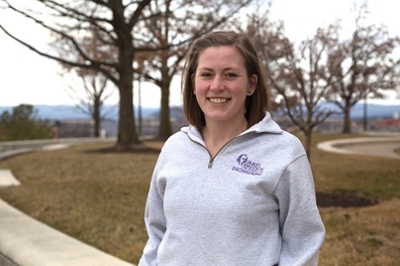Engineering Student Overcomes Odds
College of Integrated Science and EngineeringBy: Daniel Vieth
“If I were to be a role model, my message would be to first don’t give up, because your mistakes don’t define you. And second, just be as stubborn as it takes to get what you need to get done.”
- Gail Moruza
 As one of the most challenging academic programs on campus, engineering may feel like its own obstacle course for students. This stress can be made worse for female engineers who often feel that they don’t belong in a field that is still male dominated. Thankfully at JMU, there are many female engineering students and faculty members who are breaking this stereotype and encouraging women to get involved in science and technology majors. One such student is Gail Moruza, a sixth year engineering major with minors in biology and mathematics. With the help of the programs she has been involved in, her internships, and the professors that have encouraged her along the way, Moruza has overcome many obstacles and become a role model for all STEM majors.
As one of the most challenging academic programs on campus, engineering may feel like its own obstacle course for students. This stress can be made worse for female engineers who often feel that they don’t belong in a field that is still male dominated. Thankfully at JMU, there are many female engineering students and faculty members who are breaking this stereotype and encouraging women to get involved in science and technology majors. One such student is Gail Moruza, a sixth year engineering major with minors in biology and mathematics. With the help of the programs she has been involved in, her internships, and the professors that have encouraged her along the way, Moruza has overcome many obstacles and become a role model for all STEM majors.
While in high school, Moruza didn’t quite know what she wanted to study and pursue as a career. “I was looking at forensics and environmental science at different colleges, but when I visited JMU I immediately chose it because I loved the school,” said Moruza. After exploring JMU’s engineering program, Moruza began to see how she could use engineering to pursue other humanitarian work she was interested in. “Engineering was the perfect combination of stuff I liked to do, and the underlying theme was that I could use it to actually help people and as a form of service,” Moruza continued. “I saw the curriculum, and the more I got into it, the more I started to appreciate it and understand what was involved.”
Before coming to JMU, Moruza participated in the Bridging the Valley (BTV) program, where she attended science and math courses on campus a month before her freshman year. BTV was a five year partnership with other colleges and universities in the Shenandoah Valley that “introduced students to future classmates and professors, gave them an idea of the environment they would be going into, and encouraged people to stay in STEM fields,” Moruza explained. “For me, the most valuable experience was getting to dip my toes into the college life before being thrown into it.” Moruza then had the opportunity to work for BTV as a teaching assistant and mentor for a new group of young STEM majors. “It sounds cliché, but I wanted to give back to what had already given to me and try to improve upon an already good system,” Moruza added.
Through her journey as an engineering student, Moruza has had to overcome a number of obstacles. After her graduation date was pushed back, Moruza nearly dropped out of the engineering program altogether. While in the process of switching her major to biology, however, many of Moruza’s engineering professors encouraged her to finish the degree. “They were like ‘seriously, you’re giving up now, you of all people?’ So that was the voice of sense that I listened to, thank goodness,” said Moruza. After a year as a biology and engineering double major, Moruza also began to see engineering from a different perspective and realized that she wanted to use environmental biology within engineering to become an environmental engineer. Moruza later changed biology to a minor alongside mathematics.
“It’s been a bit of a journey, and I’ve learned a lot about myself and what I am capable of,” Moruza continued. “It’s helped open my eyes to the fact that college isn’t just to get a diploma, it’s an education and it’s supposed to change you.” Moruza’s persistence and work as a mentor to younger STEM majors all define her as a role model. “I think it’s really important for women to see that it’s okay to not be perfect in your academics because you are going to mess up. It just depends on what you do after you mess up that defines who you are,” Moruza continued. “You’re not going to get perfect grades, you’re going to want to scream and break your pencil in the middle of exams. But if you don’t give up, things will work out.”
After graduation, Moruza plans to continue combining her interest in engineering and humanitarian work by pursuing a master’s degree and PhD in environmental engineering and conducting research on stormwater management applications of materials science. She then intends to work in the field of water resources for areas in need across the world. “I believe that JMU’s engineering program has done an excellent job of encouraging practicality in our designs and challenging us to think and work beyond our comfort zones,” Moruza added. “With my education at JMU and what I hope to accomplish in graduate school, I can be a real help to those with urgent needs like access to sustainable clean water.”

